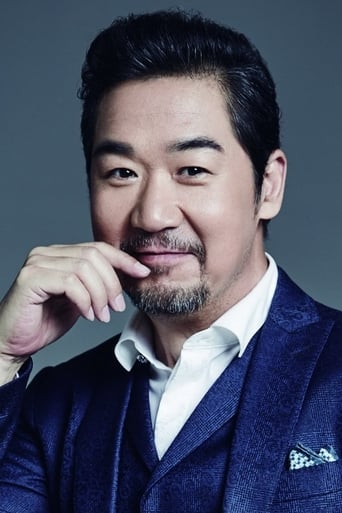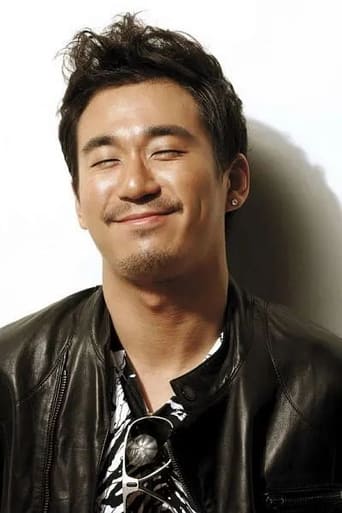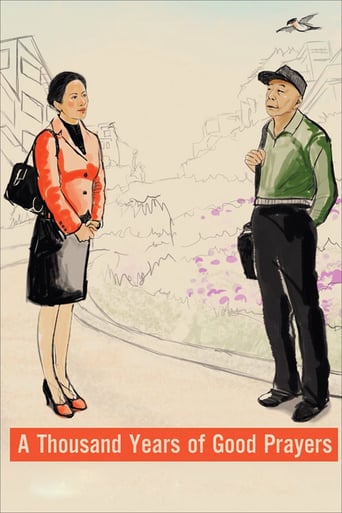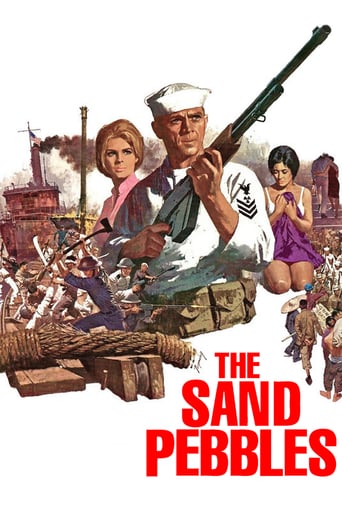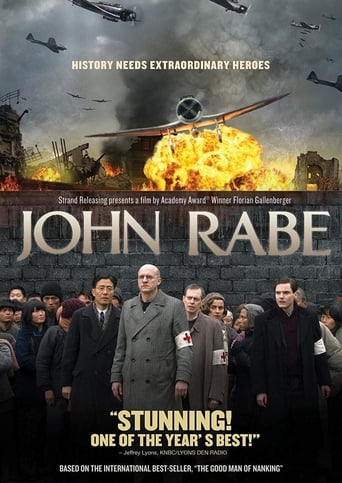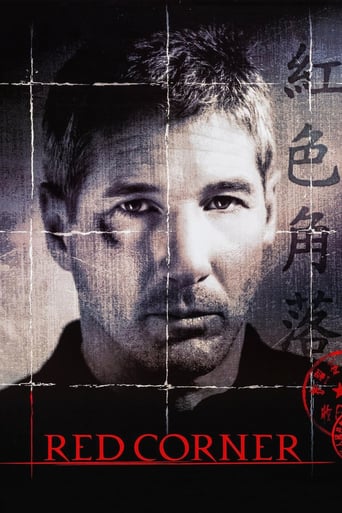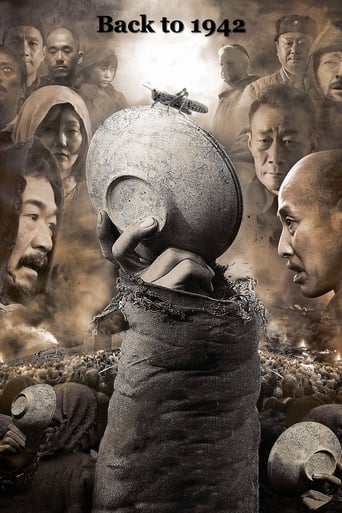
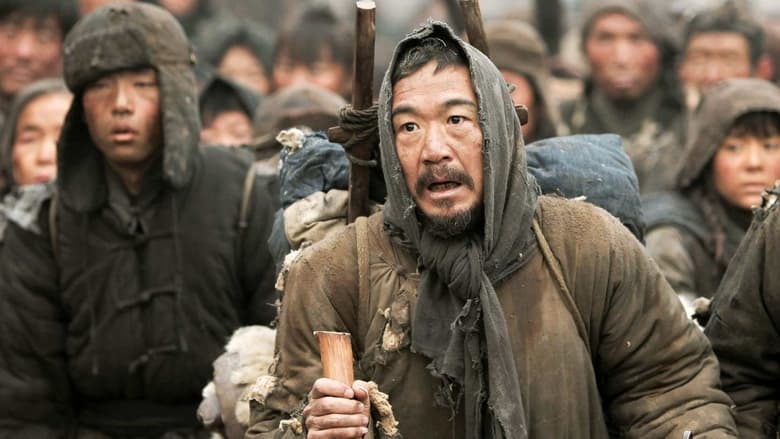
Back to 1942 (2012)
In 1942, Henan Province was devastated by the most tragic famine in modern Chinese history, resulting in the deaths of at least three million men, women and children. Although the primary cause of the famine was a severe drought, it was exacerbated by locusts, windstorms, earthquakes, epidemic disease and the corruption of the ruling Kuomintang government.
Watch Trailer
Cast


Similar titles
Reviews
Sadly Over-hyped
After playing with our expectations, this turns out to be a very different sort of film.
The thing I enjoyed most about the film is the fact that it doesn't shy away from being a super-sized-cliche;
The film never slows down or bores, plunging from one harrowing sequence to the next.
The epic of a disaster: a whole province in central China caught by drought, the people having no choice but leaving their households, taking the large road toward unknown, toward some illusory place where they could find food. Winter 1942-43, war, the army looting the refugees, the enemy bombing army and civilians together, the mass of refugees becoming a mob, all moral values forgotten, episodes of cannibalism, the political leaders caught in a cobweb of petty politics, corruption, and ineffectiveness... the death toll being somewhere between one and three million.Other stories of war and famine will keep coming, repeating the same script, endlessly, going on nowadays and forever... and as always people around turning a deaf ear, pretending unawareness, if not taking advantage:The story of the Honan famine rolled into Chungking like tumbleweeds blown by the wind. "I heard from a man who was there " "I saw in a letter from Loyang " "In Sian they say that " (Theodore H. White quoted in a site of the San Jose Stae Univ.)A survivor's grandchild would tell the story, and based on his novel this movie was made in 2012. A movie with epic breathe, shifting from the mob of refugees to the regional leaders to the national level, up to Generalissimo (Chang Kai-Shek), coming back to the victims, one of the heroes repeating the story of Job, among all atrocities around, nobody's innocent, nobody's evil, it's just our human condition here, it's about us, humans, in one of our worst moments.
A well made and serious film you shouldn't miss.Back to 1942!How many movie-goers were born before 1942? I think very few...The film is all blood and tear in Chinese history-if you ever read any Chinese history you would know a bit of how the corrupted national party of China ran the country(how they handled the famine) and the history of Japan invaded China (how cold blood of their behaviour against civilians)at the time.To younger people who never experienced war and hunger...please don't expect entertaining plots.
With big budgeted films like Assembly and Aftershock under his belt, Feng Xiaogang is no stranger to ambitious films set against the Chinese historical backdrop, which he handles most excellently through powerful, emotional dramas, balancing it out with what would be money shots of the large event that forms the canvas of his movies. With Aftershock he dealt with the Tangshan earthquake of 1976, Assembly had his war between the Communist and Nationalist soldiers, and now he goes a little further back in time to 1942, where China's Henan province suffers through its deadliest drought resulting in the death of 3 million through starvation.I guess it's quite challenging for many here to have experienced true hunger in today's relatively affluent society, but those who have been through some days without having to eat something, usually through vanity reasons of keeping artificially slim, will attest to an uncomfortable feeling. Multiply that by months on end, with a war looming and then experienced, and one can almost picture how miserable life then would have been, with food being literally scraped from what would be unthinkable as food, such as tree barks, and many willing to offer anything, most often children, as barter trade for foodstuff.Based on the novel by Liu Zhenyun titled Remembering 1942, it charts the huge drought and famine through one of China's provinces, told through the eyes of various protagonists in this sprawling epic. There's a well to do landlord in Master Fan (Zhang Guoli) who opens the movie, as we bear witness to his slow and inevitable descend from prince to pauper, having a stockpile that got naturally targeted by bandits, and when all hell broke loose, he suffers tragedy after tragedy, joining the millions of others on their trek westwards to find food, and also incidentally escape from invading Japanese forces.Then there's the religious arc, with Priest Sim (Zhang Hanyu), a Chinese man seeing opportunity in all these distraught to spread the word of Christ amongst his fellow countrymen, with his faith being shaken by constant questions how his God would have allowed this to continue, where at one point he had envisioned this situation to be similar to Moses' leading of the exodus out of Egypt. Tim Robbins and Adrien Brody also took up roles in this film, much like Christian Bale in Zhang Yimou's The Flowers of War, with the former being the priest whom Sim confides in, and the latter playing the role of a Time magazine correspondent who also lends his perspective to the growing atrocities, and ignorance of the many politicians who prefer to enjoy the company of elites, and turning a blind eye to the true situation thousands of miles away.While the film does not offer pointed accusations, it does present a series of events that may have contributed to the immense human tragedy, and this largely involves politicians, soldiers and the Japanese, where WWII almost becomes an excuse for the existence of millions of refugees uprooting themselves and moving elsewhere not only to escape from enemies, but to look for sustenance. Director Feng engages some of the best in the craft for this ironically lush production (for a film that deals with those with absolute nothingness), to bring out vivid looking shots and conditions in which the actors thrived in delivering heartfelt performances, with no holds barred effort poured into the production to make every shot look believable, plausible, succeeding in its attempt to put you right where the action unfolds.War and battle scenes also looked notches above what the director had done with Assembly. Blood and gore moments were kept realistic without the need to be gratuitous, from major scuffles amongst bandits and villagers, to constant Japanese air raids which saw bombs raining down indiscriminately against both soldiers and the long lines of civilians trying their best to escape from hunger, now having to deal with another threat which some see as a lifeline to end their miserable lives. But if looking from yet another angle outside from the premise of the film, the narrative also deals with the adage of fortunes being cyclic in nature, telling such a story where a rich man's most prized possession will be that final slap in the face when Maslow's basic theory of needs come into play, like a warning to the newly affluent that when it boils down to survival, it's every man for himself, with the elite class likely to suffer the most when the people trodden upon calls it quits.Chinese films have come a long way over the last decade, and Feng Xiaogang has shown that he's amongst one of the best out there to deliver big budgeted productions that doesn't have to void of a soul or emotional core. It's an epic on the grandest scale, succeeding because it tells stories of the human condition that everyone can identify with. Highly recommended, as I ponder what other historical backdrop the director would be tackling next, since he has a keen eye and a knack for it!
Feng Xioagang can be considered China's - possibly Asia's - most substantial film maker. His output is increasingly imposing and his box office clout means that the content of his work must come under intense official scrutiny. That made the IF I WERE THE ONE movies quite amazing as an expression of the notion that to be rich is glorious.BACK TO 1942 is clearly a tent pole movie for the Chinese cinema and then carries a double load. It is an intense, long, demanding account of the 1942 Hunan famine and refugee exodus, made more terrible by the parallel war with the Japanese and also a revision of history with Chiang Kai Shek now shown as both calculating and remote, as well as caring and authoritative but only a support player in the story of the land lord and serf reduced to destitution on their awful journey.Intriguingly, Theodore White writer of sixties Wolper Documentaries and "The Mountain Road" shows up effectively in the person of Adrian Brody, as a character.Master crafted, some of the staging is exceptional. The bombing raids are great set pieces and the film manages to keep disaster chic in hand, even if it's so grim.Essential for the serious movie goer, a strain on the casual entertainment seeker.


